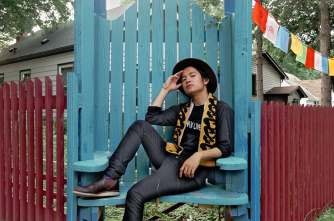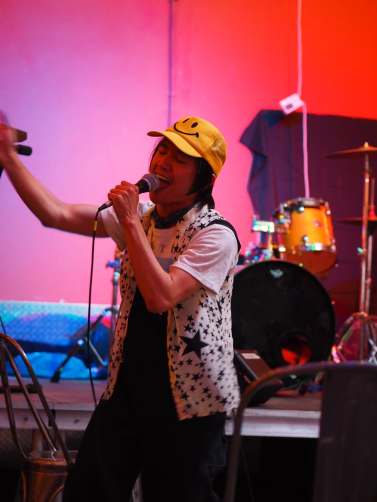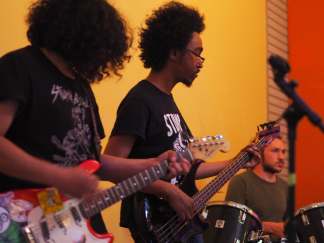Co-written by Tri M. Vo and leyen trang
This story was originally posted on Asian American Organizing Project (AAOP)’s website.
Note: Vo is comfortable primarily with he and she pronouns. Her pronoun preferences are reflected throughout the piece. Tri is still exploring the aspects of her relationship with gender, and welcomes constructive dialogue around gender.

Energy vibrates in the room; color explodes over the stage and over the band rocking out. Tri M. Vo, the lead singer, throws their head forward to the beat as fluorescent midnight‘s guitarist, Pip, and drummer, Micah, improvise rhythms and leads to the hypnotic pluck of bassist Devohn’s bass hooks.
Vo is a jungle-punk american which, they say, is “a combination of jungle Asian, as coined by Ali Wong,” and punk. The jungle Asian part is about naming his Southeast Asian side, as an american Viet.
“And the punk part is my recreational identity, where my core ethics comes from,” Vo says.
Punks emphasize the ethics of DIY, or do-it-yourself (or do-it-together, as the language has evolved), to remind themselves of the agency people have outside of consuming ready-made products pushed and spammed into our lives by large corporations and institutions. The simple idea undergirding DIY/DIT pushes against incumbent political dogmas and ways of thinking — destroying, reimagining, and building for the sake of protecting and empowering the agency of grassroots communities. As performance, punk is hard melodies, stripped instrumentation — it is music that you feel in your body, before you think about it in your head. It is art.
“Punk is not always about thinking,” Vo says. “It’s not about getting caught up in these big philosophies; it’s about action. Action oriented ways of living that center justice and liberation.”

Historically, punk as subculture has been associated with, and populated by, cisgender working class white men. It initially proliferated in the ‘80s with a strong focus on working class white people fighting for class justice. Punk subcultures continues to uplift those same identities, while shutting out people of other marginalized backgrounds.
For Vo, who is neither cis nor white, grasping the history, cultural output, and often hypocritical values of punk movements, while embodying a punk ethos through a brown, non-normative gender body is, on its own, subversive, if not revolutionary.
“I think punk is inherently black and brown,” Vo says. “Punk is all about challenging unjust and violent systems, while unsettling people content with and benefitting from the status quo. By raging against cishet, normative, white bodied Terrorism and Supremacy in our Indigenous, Black, and Brown bodies, we are inherently punk.”
“We don’t have to perform what white men perform to be punk. I say that, but you can identify as not punk if you want,” she encourages.
Vo adds that being an immigrant adds a layer of complexity; especially because punk is so Euro-centric and is often used as an aesthetic for many right wing groups.
“And being an immigrant, there are two stark paths you can follow,” Vo says. “There’s the path of assimilation, and there’s the path of co-liberation.”
Many Asian immigrants to the States, as far back as the first wave of Chinese and Japanese people, end up assimilating into the American culture because enduring the oppressive, if not lethal, forces of the American empire became the priority as a matter of survival.
“So you don’t see many Asians who are into activism, much less the creative and performance aspect of it,” Vo explains. “I have all these white friends whose family showed them rock music, which is a pathway into other forms of white American cultural and hegemonic capital. Meanwhile, we Asians are just here trying not to die, which is not fertile ground for expression and learning about the arts, and the big picture use of arts towards community and co-liberation.”

Jenny Zander.
But Vo hopes that changes.
“I want to see more kids in Southeast Asia picking up cheap guitars and making music because it’s about making meaning out of helplessness. It’s about encouraging bravery among your peers and elders in the face of violence and fatalism.”
This expression piece is important in movement building and in activism for Vo.
“Art is a container,” she says, “that can change shape and that you can pass around. It’s meant for catharsis. It’s for people to arrange confusion in a way that makes sense.”
“Punk for me isn’t just ethics and activism, but also about performance, about making sense out of things that seem meaningless and totally impossible to comprehend.”
Tri M. Vo is the vocalist and antics-monger for local Minneapolis punk band, flourescent midnight. Outside of performing music, Vo enjoys performing improv at HUGE theater, going to too many concerts, collecting craft beer, and not checking who interacts with her often charged social media posts. Ever.
You can add her on Facebook (she’s a prolific Messenger user).